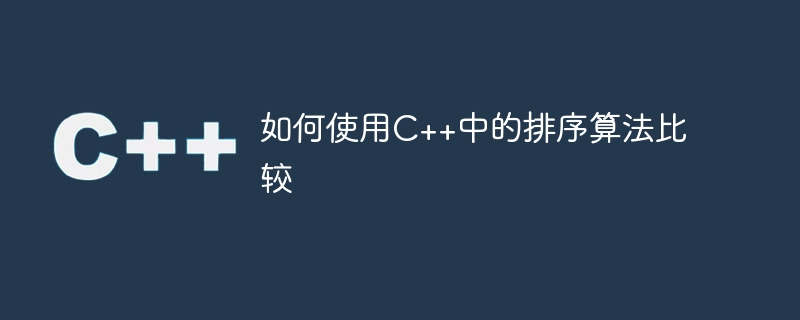如何使用C++中的排序演算法比較
- WBOYWBOYWBOYWBOYWBOYWBOYWBOYWBOYWBOYWBOYWBOYWBOYWB原創
- 2023-09-20 10:57:271151瀏覽

使用C 中的排序演算法進行比較
排序演算法是電腦科學中最基本且常用的演算法之一。在程式設計中,我們經常需要對一組資料進行排序,以便更好地組織和處理資料。 C 提供了多種排序演算法庫函數,例如std::sort和std::stable_sort等。本文將介紹如何使用C 中的排序演算法進行比較,並提供具體的程式碼範例。
一、std::sort函數的使用
std::sort函數是C 標準函式庫中常用的排序函數。它可以對一個陣列或容器中的資料進行排序。以下是std::sort函數的函數原型:
template
void sort (RandomAccessIterator first, RandomAccessIterator last);
以下是使用std::sort函數進行排序的範例程式碼:
#include <iostream>
#include <algorithm>
#include <vector>
int main() {
// 创建一个整数数组
std::vector<int> arr = {5, 2, 9, 1, 8};
// 使用std::sort函数对数组进行排序
std::sort(arr.begin(), arr.end());
// 输出排序后的数组
for (int num : arr) {
std::cout << num << " ";
}
return 0;
}在上述程式碼中,首先我們建立了一個整數陣列arr,然後使用std::sort函數對該陣列進行排序。最後,我們透過循環遍歷數組,輸出排序後的結果。
二、std::stable_sort函數的使用
std::stable_sort函數也是C 標準函式庫中的一個排序函數,與std::sort函數的不同之處在於,std: :stable_sort函數可以保持兩個相等元素的相對順序。以下是std::stable_sort函數的函數原型:
template
void stable_sort (RandomAccessIterator first, RandomAccessIterator last);
#以下是使用std::stable_sort函數進行排序的範例程式碼:
#include <iostream>
#include <algorithm>
#include <vector>
int main() {
// 创建一个结构体数组
struct Person {
std::string name;
int age;
};
std::vector<Person> people = {
{"Alice", 20},
{"Bob", 18},
{"Carol", 22},
{"David", 20}
};
// 使用std::stable_sort函数对结构体数组按照年龄进行排序
std::stable_sort(people.begin(), people.end(), [](const Person& a, const Person& b) {
return a.age < b.age;
});
// 输出排序后的结果
for (const Person& p : people) {
std::cout << p.name << " " << p.age << std::endl;
}
return 0;
}在上述程式碼中,我們建立了一個結構體陣列people,其中每個元素包含一個人的姓名和年齡。然後,我們使用std::stable_sort函數對結構體陣列依照年齡排序。排序時我們使用了一個lambda表達式,指定依照Person結構體的age成員進行比較。最後,我們透過循環遍歷數組,輸出排序後的結果。
總結:
在本文中,我們介紹如何使用C 中的排序演算法進行比較,並提供了具體的程式碼範例。透過掌握和靈活應用C 中的排序演算法,可以更好地組織和處理數據,提高程式的效率和效能。希望本文對你的學習和實踐有所幫助。
以上是如何使用C++中的排序演算法比較的詳細內容。更多資訊請關注PHP中文網其他相關文章!

